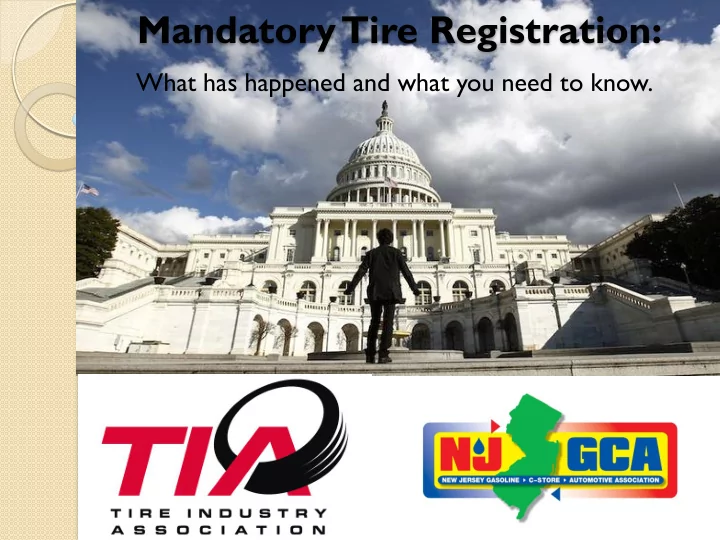

Mandatory Tire Registration: What has happened and what you need to know.
The Bad Old Days Up until 1982, whenever a tire was sold to a motorist, the retailer was responsible for filling out a complete registration form about the customer. The form required the lengthy Tire Identification Number (TIN) to be included for each tire sold. It was hoped that when the tire manufacturers discovered they had improperly manufactured their product, the form could be used to contact motorists for a recall.
In reality, the process was so burdensome for small businesses that many simply ignored the rule. Fines could (and were) levied at a rate of up to $1,000 per tire, with a cap of $700,000 per shop. Businesses were literally being forced to close by this burdensome regulation. In 1982 Congress passed and President Reagan signed a bill removing this regulation and replacing it with a voluntary system.
Examples of Tire Identification Numbers
David vs. Goliath in DC In February 2015 NJGCA staff headed to Capitol Hill as part of the Tire Industry Association’s “Lobby Day” to discuss issues affecting our members. One of the top issues we discussed was a plot to bring this regulation back from the dead, being pushed by the big rubber manufacturers.
More Than the Burden While the burden of this regulation and the potential for massive fines is enough to worry every tire dealer, there was another worrying motive behind this push. The registration forms, which include the customer’s name, mailing address, phone numbers and email address, would be given to the Tire Manufacturers themselves. This comes just as manufacturers are increasingly selling their tires directly to consumers, cutting out the middle-man (You!) Tire manufacturers lobbied members of Congress hard and donated tens of thousands of dollars to influential Senators’ reelection campaigns.
Capitol Battleground In May NJGCA and TIA staff met with NJ Congressman Leonard Lance (R), who serves as Vice-Chair on an influential Sub- Committee. In June it was revealed that tire registration had been slipped into the “must - pass” transportation funding bill. Ultimately the bill failed and a temporary funding bill was forced through Congress without tire registration.
DC Swamps In October the Senate passed a Highway Bill over 1,300 pages long. One of those pages would give the federal National Highway Transportation Safety Administration (NHTSA) the freedom to bring back the mandatory registration regulation. The tire registration amendment was passed without a single public hearing on the issue, and with no testimony given. Afraid that the nation’s highway funds will go broke, the House of Representatives also passes a Highway Bill that includes the tire registration provision, again without a single hearing on the subject.
A “conference committee” is formed in November between the House and Senate to sort out the differences in the Highway Bill. A late edition to the committee is New Jersey Congressman Frank Pallone (D). NJGCA reaches out to Rep. Pallone and is able NJGCA Board members Joe Ocello and Craig Copeland also joined the meeting with the Congressman to sit down with him the morning before Thanksgiving.
Resolution Unfortunately, it becomes clear that it is too late to completely strip this provision from the bill. Rep. Pallone is able to successfully get the registration mandate amended to ensure that NHTSA conducts a study on how to most fairly create this regulation. This study includes mandating manufacturers use modern technology to let retailers scan the tires, and to have the customer information stored with the NHTSA instead of being sent to the manufacturer. Only two new amendments were made to the entire bill, ours was one.
NJGCA Members collectively sent nearly 700 email messages to our 12 Representatives, 2 Senators, and President Obama through our “ VoterVoice ” system which allows members to contact their legislators with one of several pre- written messages with one click or write their own personalized message. The national Tire Industry Association (TIA) honored NJGCA for our strong efforts in mobilizing grassroots support and reaching out to our state’s influential Congressmen.
What Now? Tire registration continues to be voluntary — for the moment. TIA is continually reaching out to both government officials at NHTSA as well as influential members of Congress from both parties to delay the implementation of mandatory registration. TIA Executive Vice President Roy Littlefield was scheduled to appear today, but instead is meeting with US Transportation Secretary Anthony Foxx on this issue. NJGCA will continue to work with TIA on this issue and will keep members informed.
Tire Aging In October the National Transportation Safety Board (NTSB) released their report on tire safety. In addition to recommending the return of mandatory tire registration, they raised concerns about “tire aging”. NJGCA has opposed a state bill to require every tire have a label attached to it clearly stating the manufacture date. The bill would also ban the sale of tires more than ten years old, even if they have never been used. Violations of the bill would be up to $10,000 for the first offense and up to $20,000 for subsequent violations. Such limits are arbitrary and not backed up by science. The bill has so far been held from Committee.
Recommend
More recommend